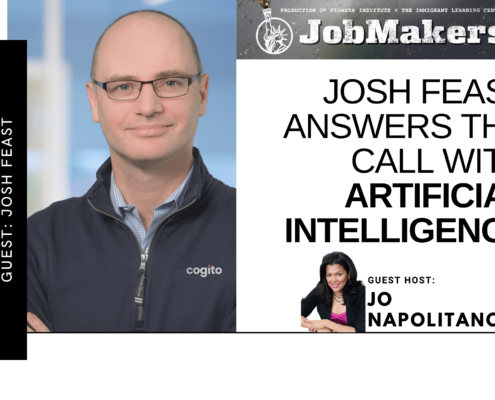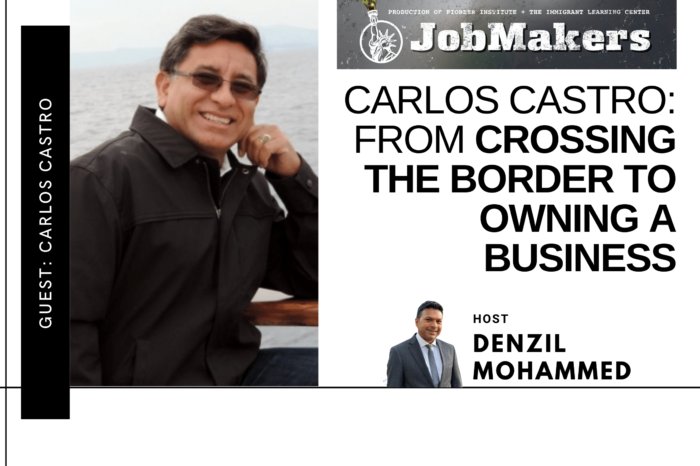Carlos Castro: From Crossing the Border to Owning a Business
/in Economic Opportunity, Featured, JobMakers /by Editorial Staff
This week on JobMakers, host Denzil Mohammed talks with Carlos Castro, president and CEO of Todos Supermarket in Woodbridge, Virginia, a successful business employing more than 200 people. He describes the perilous conditions in his native El Salvador, why he crossed the border to America, and why immigrant business owners tend to hire people like them, in this week’s JobMakers.
Guest
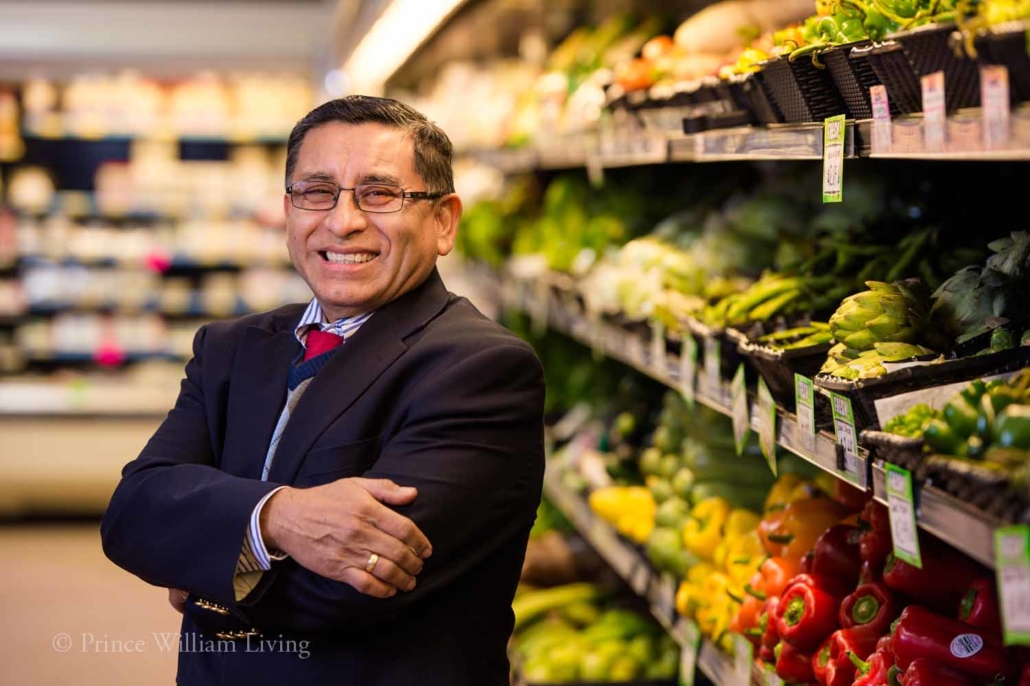 Carlos Castro is the president of Todos Supermarket, which specializes in foods and services to immigrants from Latin America, the Caribbean and Africa at stores in Woodbridge and Dumfries, Virginia. Castro immigrated to the U.S. when he was 24, and worked a variety of odd jobs as a cleaner, cook and dishwasher, before he took classes, learned English, and started a construction business. In 1990, 10 years after leaving El Salvador, he became a U.S. citizen and opened the first Todos Supermarket. Since then, he has repeatedly been named one of the Fantastic 50 businesses of the year by the Virginia Chamber of Commerce and expanded to a second store in Dumfries. In addition to employing nearly 200 local residents and serving thousands of customers, he’s become an important community leader. Castro is a founder of the Hispanic Organization for Leadership and Action, and served on the boards of the Prince William Chamber of Commerce, Youth for Tomorrow, Potomac Health Foundation, Hylton Performing Arts Center, Northern Virginia Community College Education Foundation, and the Norther Virginia Workforce Development Board.
Carlos Castro is the president of Todos Supermarket, which specializes in foods and services to immigrants from Latin America, the Caribbean and Africa at stores in Woodbridge and Dumfries, Virginia. Castro immigrated to the U.S. when he was 24, and worked a variety of odd jobs as a cleaner, cook and dishwasher, before he took classes, learned English, and started a construction business. In 1990, 10 years after leaving El Salvador, he became a U.S. citizen and opened the first Todos Supermarket. Since then, he has repeatedly been named one of the Fantastic 50 businesses of the year by the Virginia Chamber of Commerce and expanded to a second store in Dumfries. In addition to employing nearly 200 local residents and serving thousands of customers, he’s become an important community leader. Castro is a founder of the Hispanic Organization for Leadership and Action, and served on the boards of the Prince William Chamber of Commerce, Youth for Tomorrow, Potomac Health Foundation, Hylton Performing Arts Center, Northern Virginia Community College Education Foundation, and the Norther Virginia Workforce Development Board.
Get new episodes of JobMakers in your inbox!
Read a Transcript of This Episode
Please excuse typos.
Denzil Mohammed:
I’m Denzil Mohammed, and this is Jobmakers.
Denzil Mohammed:
What do you know about migrants who cross the Southern border and where they go in life? If their journey is successful, do you know what they’re fleeing? What skills they may have, what their dreams are, what motivated them to take such a dangerous risk for Carlos Castro, president and CEO of Todo Supermarket in Woodbridge, Virginia, it was decapitated heads lined up on fences. It was a civil war. It was no economic opportunity in El Salvador. Carlos took a huge risk as a young man to cross the border without authorization. But in that dangerous journey was a determination to support his family and find them safety as any husband and father would Carlos, who became a us citizen in 1990 is now a business and community leader in Northern Virginia, employing more than 200 people. He explains some of the things Americans find perplexing. Like why do migrants cross the border? Why immigrant business owners tend to hire people like them and what life is really like in the hellish countries, where desperate migrants come from in this week’s Jobmakers, Carlos Castro, welcome to the Jobmakers podcast. How are you?
Carlos Castro:
Very good. Thank you for the invitation.
Denzil Mohammed:
So you are founder, president and CEO of Todos Supermarkets in Woodbridge Virginia. Describe your business for us. When did it launch and where is it today?
Carlos Castro:
I was at a party with a friend of mine, for a friend of mine and, and she came to me and she said, look, there is a need for a grocery store here. Why don’t you start one? And I go like, why me? You know, I don’t know anything about grocery store, but later in, you know, couple of a year later, I was talking with some friends about starting a business and we went through many, many ideas. And then I remember what my friend told me and we, it to open to supermarket because it was only a tiny Mexican store, you know, I mean, tiny, like 500 square feet. It was very, very small. And we took 2,500 square feet. It was very, very small, but we didn’t know how to negotiate contract. You know, we just went and signed for whatever they offered me.
Carlos Castro:
So then, my wife was running it. The idea was that my wife was maid, you know, a,uhouse cleaner and that she could have her own business and I would have my own business, of course, you know? And,uand that’s how we started in 1990. And,after I realized that we were actually, I was not doing very good in construction because I was most of the time on the phone with my wife,utrying to resolve issues and figure out why we’re not, we were not selling. Then I did decided to give up my construction business in DC and,come to the store, help my wife. The problem is that she did not have money to pay me a salary. She barely paid herself a salary. So I became a tax preparer, I realized that,upeople were not taking advantage of being homeowner, the home ownership, you know, so I,uI became a realtor and,uand I was working out of the store.
Carlos Castro:
It was, you know, very difficult years, but we start to ask our customers, what would you like us to have, you know, every day since day one and that how we actually became to know that even though we speak Spanish, even though we’re Latinos and everybody thinks we are all Mexican, you know, it, it just not that way, you know, Bolivians have their food, Colombians, you name it. So it was a learning, exciting learning and very difficult time. But,uthe beauty of it is that in some countries, the owner of the businesses are considered very smart people that you can go and get our advice, you know, and,upeople would come to my store and ask for things. And then my wife would tell them, come back at six, my husband is gonna be here. And,uand then by the time I got to the store, I had a line of people that had something, you know, to, to ask and it felt really good and it create that kind of loyalty in our community.
Carlos Castro:
And that went on for five years. Then we decided to move to another a 5,000 square feet in five years. And then another five years, we moved to 10,000 and then to thousand, by the time we were in 20, 20 10, we actually got into this one location at Mar Plaza in Woodbridge that has a total of 75,000 square feet with offices and headquarters. And everything had like 180 employees still have the hundred 80, some of the hand left, you know, and we have hire new people. My attitude has been always that, you know, we hire for attitude. You know, you get the right attitude. I can teach you the business. So my general manager, you know, I found her flipping hamburgers at the McDonald nearby. And she actually took the offer the same day. I put it to her. She’s now my general manager. And her case has repeated on over, over, but my father teaching, he was always helping. He was a builder and he always was observing people. Cause I was a kid always with him. I was his first child. So he was always looking at people and, and giving the opportunity. Todo supermarket have done the same. You know, we give all the people opportunity when we bring new people to the team, nobody gets to worry cause we don’t compete. We complement each other. So
Denzil Mohammed:
Giving people opportunity is key. Especially recently arrived immigrants. They just want, they just wanna crack and they wanna break. And they’re able to develop their skills from flipping hamburgers to becoming general manager of a massive 75,000 square foot store. I mean, that’s, that’s pretty incredible. And you mentioned your father and growing up, obviously you didn’t grow up in, in Northern Virginia. You grew up in El Salvador. Yeah. Most listeners will have no idea what life is like in a place like El Salvador paint a picture for us. What was it like growing up?
Carlos Castro:
We were very poor. My father built his, his house in the capital with salvage materials. You know, pieces of metal. We laugh all the time because I told him that we had the biggest window in the living room. The only problem is that it didn’t have any glass just to hold, you know, so, and, and we used to go and we, we closed our door and we, we, we put like a big piece of pipe to keep it locked. And then of course you, you lock the door and then the window is open where you can run a truck through it. So it was funny. We didn’t have any running water or indoor plumbing. And my father kept reminding us what we needed to do to really survive and reminding us that we didn’t have any inheritance to receive that all we had was, you know, an able body and a good head on them.
Carlos Castro:
And then that we have to do our best. And one thing that happened during those days is that, you know, good jobs were reserved for people that were friends of the owners, of the company or boss in the company and put people like me didn’t have any chance. I work with my dad the first few years and I moved to work at a factory, but, you know, to get a 25 cent salary increase in a year, we almost had to go into a strike. It wasn’t, it was like that. But, you know I enjoyed what I did and luckily I was able to climb the ladder at a very young age, very young age. I was supervising people, you know, by the time I was 19 and I was supervising a production plant of a big factory when I was studying industrial engineering on my first year.
Carlos Castro:
And I was only like, you know, 19, I mean, 20, 20 years old. And well, you were happy. You were all set because you, why, why did you need to move? Yeah, exactly. You know, and then we had a civil war going on really bad. That was the military against the left wing activist from Cuba and Nicaragua. And it become a terrible civil war. You found, you know, people decapitated with the hair stuck on the fences. You know, it was horrifying. And me being the eldest of my siblings, I had the opportunity that some of my middle school classmate gave me to come to the us, of course, illegal because we had no chance of getting a visa. So I thought really quick because he pressed the question on me, you know, why don’t you go to the US work for a couple of years, you know, learn English and maybe by then the war will be over.
Carlos Castro:
And then you can provide for your siblings and your mom and your dad. I had a job there in the unions and the guerrilla were taking over and shutting down the factories. As a matter of fact, my, the factory where I worked, it was actually, you know, one of three that were still open. So I thought this is gonna collapse any minute. And I took that opportunity. You know, I came with a coyote and smuggler and I got caught across the border. So I got deported. After I spent a month and a half in detention, I got to Salvador at midnight when they dropped me there. And then I hid for a week and then got more money. I found my motorcycle and I headed back on my own, just actually with a cousin. And we went across Mexico and, across the border.
Carlos Castro:
And luckily we made it and that’s how I’m here. You know, the first year I all I did was save money to buy my ticket back to a Salva <laugh> because I wasn’t really enjoying my wife was in Salvador with my little kid. That was one year old when I left. So all I wanted is to get back to Salvador and, and but then I got the opportunity of working in construction and I was really good. I am really good in construction. You know, I love it. I enjoyed since I was a little kid, so that was my ticket to success. I was able to save for my house. And then I moved on to set up my own company with the customers that my boss couldn’t serve, he would give to me. So he helped me.
Carlos Castro:
He, he gave us actually, he signed our job certification for my wife. And then by my wife getting her visa, my kid and myself could get a visa. So actually she came a year after I was here. I brought her in again, you know, through the border, she got caught, she was in jail, but we were able to get her out of jail and into, through an organization and into here. And that how she came to work for the architect, my boss, and, and I asked him, and he, he agreed to sign our papers
Denzil Mohammed:
With things being so terrible. I mean, you were, and during a civil war in your country, and as you said, decapitated heads in the streets and, oh, I mean, it’s something that we here in the US can’t even fathom, it’s it, it’s something so distant to us. And yet that was your daily reality who would not want to escape something like that. I would bring it to the present day where you went from 1000 square feet to 75,000 square feet with total supermarket in Woodsbridge Virginia. Yyou basically realized that there was a food desert for recent migrants to that area and ended up taking over the giant supermarket. What we had lost in here call stop and shop. You’re involved in several initiatives in your community. Yeah. And one of them is helping a nonprofit called the Hispanic organization for leadership and action called or Ola, which works to engage in empowered the Latino community. Describe your work with Ola. And why is it important and what benefits have you seen arise from it?
Carlos Castro:
Well, well, Ola was created like 20 years ago by a visionary chairman of the board here in inland county that he saw the need because of the growth of the community. He said, you need to have an organization. And, and basically our idea is to develop leadership, to get people into the community, to be part of the mainstream community, little but little. So we have, we have focused our effort in being a center of information and bringing information to the community by creating events where the community show up and, and the agencies that are in the county show up. And then we, we talk about everything that is at their disposal fall in the county or state government. And we want to focus in leadership development. We want to make sure that we create resilient community, that ourselves self dependent that are non dependent of, you know, other organizations or the government, but actually on their own, you know, the basically leaders. So the result
Denzil Mohammed:
Of that has been recently arrived or almost recently arrived migrants to the area, be being part of building up the community, by taking on these leadership roles. It brings me to a point that, that I is a sticking point for a lot of us born people. I read a recent article, well from 2017 that mentioned 90% of your employees are Hispanic. Respond to questions about why you and other business owners tend to hire people of similar ethnic background. Does that tie into what you’re just talking about, building a resiliency, meaningful job opportunities and that kind
Carlos Castro:
Of thing. Generally, you want to have people to work with you that you trust and the people from your country, the first people that you trust, or whether it’s a relative or friend or somebody, and it takes a while to build a business. So that’s how ended up hiring people that speak Spanish. But the other problem that we have as immigrant companies, or what do you call it? International companies or ethnic, you know, companies let’s say regular Americans or, people from other countries. I mean, from, from other groups that are not used to work with Latinos, they don’t see, or any other, any group, they don’t see their future in any company. And then me give you an example, you know,uonce I hire a, the daughter of one of my customers as my,upersonal assistant, and,she was asked, why would you go to work there? You know, why don’t you go to another American company that you have a better future? And, and, you know, at some point I ran a campaign, I thought this is in order for me to grow. I need to attract more people or different groups. So I run a campaign to hire managers, and I had a good response of people.
Carlos Castro:
By the time we set up the first interview, it was kind of sad to see that people park their car, go around, look into the store, walk around, walk around the store, and then walk back out. At that point, I realized, you know, I’m not gonna attract American people to work for me. I mean, we’re a little grocery store, you know, what do I think? You know? And then I decided I’m gonna put my efforts to make sure that my people get the opportunity.
Denzil Mohammed:
That is so interesting. And I don’t think any US born person would, would be thinking like that. Like, would an American want to go to work for the, the Hispanic grocery store out there in Woodsbridge? What do they know about oxtail, for instance, uwhat do they know about halal meat? I mean, that is really interesting. So thank you for shedding light on that as,uimmigrant and minority business owner. That, that was really great. UI wanna quote, thank you. I wanna mention one, you, you mentioned your father earlier and it’s clear he’s had a very profound impact on your life as not just a business owner, but as a man. Uwhat has been the influence of him on your, on your work? I know from previous interactions with you, you mentioned he was very strict, but he also had a, a, a set of principles and values, right?
Carlos Castro:
Yes. You know that’s pretty much it’s about principles and values. My father didn’t have the opportunity to go to school. He actually rebelled against my grandparents because he was the son of a maid. So he wasn’t really part of the family and they wouldn’t give him the opportunity to go to school. So he, he left the house and he was probably 12. And then he met people along the way, cause he was very charismatic and he made some good friends and people taught him. He was, he was a genius in a way, you know, he learned to be a builder and he never went to, to 12th grade. And actually he finished 12th grade when he was married to my mom. And he was like 40 some years ago. And I enjoyed so much when they put his boss was probably a young architect or a young engineer.
Carlos Castro:
And when they taught me like, whatever, I know, I know it because your father, you know, I went to school, I have a lot of knowledge, but I don’t know how to do these things. And he taught me. And so he was very good at that at, at particularly in the structures, you know, his study at night and he kind of look at everything. He was able to go through a set of blueprints and have a list of all the errors that were in those blueprints and give it to the architect. We need to fix it, you know? And like I said, he was a perfectionist, so he demanded from us kind of like the same thing that he demanded from himself.
Denzil Mohammed:
And I’m, I’m so happy that, that you came here to the US, you know, as you say, with a coyote illegally detained, deported came back, you had that persistence and that led to you being able to have the opportunity that you would not have, obviously did not have in El Salvador at the time, to be able to put your hard work to use and let it result in something. And it resulted in, you know, dishwashing and janitorial, and then construction then owning your own construction company than owning your first small supermarket. And now Todos is a giant, let’s put it that way. What are your views on America? The United States as a home for immigrants,
Carlos Castro:
It’s a place that I dream about. You know, I didn’t think that the, that the sidewalk where, you know, an idea where you get a shovel and you shovel dollars into your pocket, right. But I thought that it was a place where there is good people that can help you succeed. And and that has been my experience. You know, people helped me along the way. I was not asking a lot of the time that people came to my rescue, very good hearted people in America. And I think we need to keep that spirit. As new immigrant, we need to help others to, to achieve their dreams, you know, so that we give others opportunities, the opportunity that were given to us, you know, for immigrants right now is very difficult. As we all, you know, there is people driving their cars into a crowd, you know, or just shooting somebody or hating you for no reason. You know? I think as immigrant, we have the obligation to make sure that we get enculturated with the rest of the community that live around us. I think it’s still the best place on earth. If you want to actually succeed. If you want to make something about yourself, it’s still the best place on earth. You know, as long as you don’t find anything to come up with excuses, you know, excuses are not allowed. If you want to succeed in the US.
Denzil Mohammed:
Jobmakers is a weekly podcast about immigrant entrepreneurship, contributions and research produced by pioneer Institute, a think tank in Boston and the Immigrant learning center in Malden, Massachusetts, a not for profit that gives immigrants a voice, got comments, questions, know someone. We should talk to email Denzel that’s D N Z I L, at jo makerspodcast.org. That for joining us for this week’s incredible story of one immigrant’s resilience, success and contribution. Next Thursday at noon, we talk with Jeff Farah general counsel for the national venture capital association about why immigrants and job makers like Carlos have virtually no avenue of migrating or remaining in the US an outdated, but fixable immigration system that doesn’t adequately serve America’s needs. I’m Denzil Mohammed. And thank you for listening to Jobmakers.
Recent Episodes:
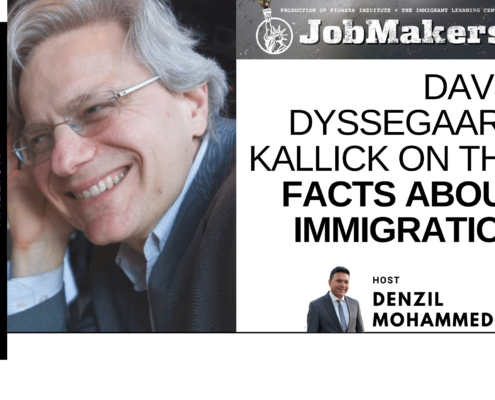
David Dyssegaard Kallick on the Facts about Immigration

Ely Kaplansky Goes from Immigrant to Inc. 5000 Insurance Entrepreneur
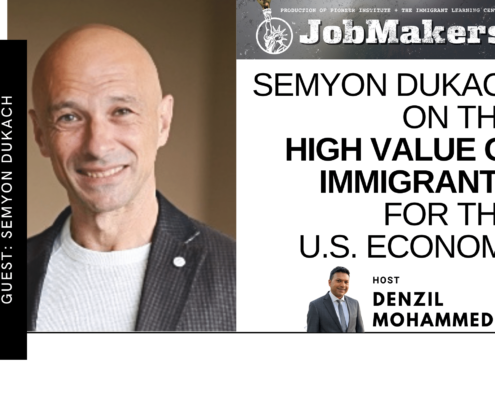
Semyon Dukach on the High Value of Immigrants for the U.S. Economy
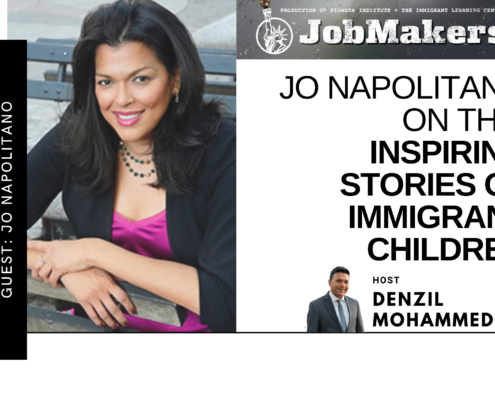
Jo Napolitano on the Inspiring Stories of Immigrant Children

Umesh Bhuju Seeks a Fair Deal for Immigrants, Farmers & the Environment

Dr. Babak Movassaghi on Winning in Football & Healthcare Innovation

Jitka Borowick on Starting a Small Business during COVID
